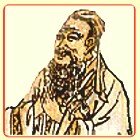|
Confucianism was interpreted and shaped by many sages and philosophers over the years. The best known of these, and the only other historical figure to have his name Latinised, was MENCIUS (Mang Tzu) who was born in 371 B.C., in the province now known as Shan-dong, and died in 289 B.C. He was taught by descendents of Confucius's followers and closely followed Confucian philosophy, particularly the statement "only good men should rule and that the ruler's right to rule is a mandate of heaven."
He was probably the greatest of Chinese sages after Confucius and was not only a philosophical idealist but also addressed practical issues such as social and political reforms, taxes, road maintenance and relieving the conditions of the poor.
|
